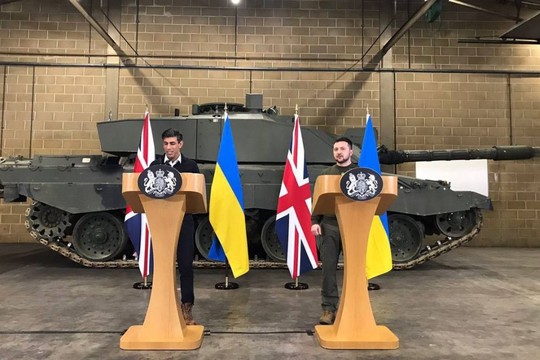UK Prime Minister Rishi Sunak with Volodymyr Zelensky
Ukrainian president Volodymyr Zelensky made an unexpected trip to Britain last week on a whistle-stop tour of European capitals, pleading for more powerful and longer-range weapons to use in his war against Russia. What was hard to ignore once again was the extent to which the UK is playing an outsize role in Ukraine, writes Jonathan Cook, a British writer and a freelance journalist.
Last year, shortly after the start of the war, the then-prime minister, Boris Johnson, hurried to Kyiv – presumably on Washington’s instructions – apparently to warn Zelensky off fledgling peace talks with Moscow. Since then, the UK has been at the forefront of European efforts to entrench the conflict, helping to lobby for the supply of weapons, training and military intelligence to Ukrainian forces.
British tanks and thousands of tank shells – including, controversially, some made from depleted uranium – are being shipped out. Last week, the UK added hundreds of long-range attack drones to the inventory.
And an unspecified number of £2m-a-blast Storm Shadow cruise missiles, with a range of nearly 300km, have started arriving. Last week Ben Wallace, Britain’s defence secretary, said the missiles were already in use, adding that Kyiv alone was deciding on the targets. Storm Shadow allows the Ukrainian military to strike deep into Russian-annexed parts of Ukraine – and potentially at Russian cities too.
Britain now pays little more than lip service to the West’s claim that its role is only to help Ukraine defend itself from Russian aggression. The supply of increasingly offensive weapons has turned Ukraine into what amounts to a proxy battleground on which the Cold War can be revived.
During Zelensky’s visit to the UK last week, Johnson’s successor, Rishi Sunak, effectively acted as an arms broker for Ukraine, joining with the Netherlands in what was grandly dubbed an “international coalition” to pressure the Biden administration and other European states to supply Kyiv with F-16 fighter jets.
Washington appeared not to need much cajoling. Three days later, Biden dramatically changed tack at a G7 summit in Japan. He effectively gave a green light for US allies to supply Ukraine not only with US-made F-16s but similar fourth-generation fighter jets, including Britain’s Eurofighter Typhoon and France’s Mirage 2000. Administration officials surprised European leaders by suggesting the US would be directly involved in the training of pilots outside Ukraine.
British officials, meanwhile, indicated that the UK would start training Ukrainian pilots within weeks.
It is hard to imagine that the UK is heading off-script. More likely, the Biden administration is using Britain to make the running and soften up Western publics as Nato becomes ever more deeply immersed in the military activities of Russia’s neighbour.
Ukraine is being gradually turned into the very Nato forward base that first set Moscow on course to invade. At the same time, Britain appears to be exploiting the Ukraine war as a showcase for its weaponry. After the US, it has been the largest supplier of military equipment to Ukraine.
This week it was reported that UK arms exports hit a record £8.5bn, more than double last year’s total. The last time Britain was so successful at selling weapons was in 2015, at the height of the Syrian war.
In March, ‘Declassified’ broke the story that some of the thousands of tank shells Britain is supplying to Kyiv are made of depleted uranium (DU), a radioactive heavy metal produced as waste from nuclear power plants. DU shells fragment and burn when they hit a target. One analyst, Doug Weir, from the Conflict and Environment Observatory, told Declassified that the ammunition produces “chemically toxic and radioactive DU particulate [microscopic particles] that poses an inhalational risk to people”.
Nonetheless, British ministers insist the threat to human health is low – and worth the risk given the military gains in helping Ukraine to destroy Russian tanks. A growing body of evidence following the use of such shells by the US in the former Yugoslavia in the 1990s and by Britain and the US in Iraq a decade later undermines these reassurances.
Italian courts have upheld compensation claims against the country’s military in more than 300 cases where Italians who served in the police or as soldiers in Bosnia and Kosovo have died of cancer after being exposed to DU.
Many thousands more Italian former service-people are reported to have developed cancers.
The West has taken little interest in researching the effects of DU weapons in Iraq, even though local civilian populations have been the most exposed to its contamination. DU shells were used extensively during both the 1991 Gulf war and more than a decade later during the US and British-led occupation of Iraq.
Iraqi government statistics suggest the rates of cancers leapt 40-fold between the period immediately before the Gulf war and 2005.
By lobbying for more overtly offensive weapons and introducing DU shells into the war, Britain has raised the stakes – it is driving the war’s logic towards ever greater escalation, including nuclear escalation.
Russia itself possesses DU weapons but is reported to have avoided using them. Moscow has long warned that it regards use of DU in Ukraine in nuclear terms: as the equivalent of a “dirty bomb”.
Britain is also creating a situation where a catastrophic move, or miscalculation, by either Russia or Ukraine is becoming ever more likely, as events last week highlighted only too clearly.
Russia struck a military ammunition depot in western Ukraine, creating a giant fireball. Rumours suggested the site may have included British DU shells.
With Ukraine soon to be in possession of a full array of offensive weapons, largely courtesy of the UK – not only long-range drones, cruise missiles and tanks but fighter jets – it is not hard to imagine terrifying scenarios that could quickly bring Europe to the brink of nuclear conflict, stresses Jonathan Cook.
read more in our Telegram-channel https://t.me/The_International_Affairs

 11:10 29.05.2023 •
11:10 29.05.2023 •























